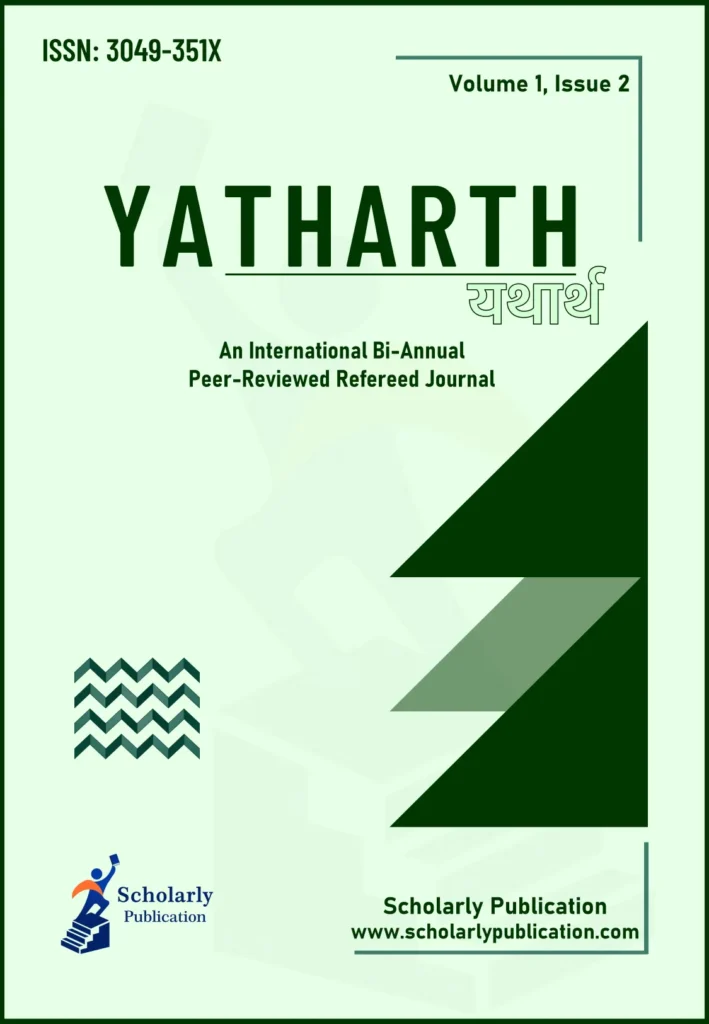Comprehensive Analysis of Waste Management Practices in India
Volume 1, Issue 2, Article Number: 252003 (2025)
Home >> Yatharth >> Volume 1, Issue 2
Monika Rathi1,* | Rupali Bhouradia2
1Research Scholar, Department of Political Science and Public Administration, Banasthali Vidyapeeth, Newai, Rajasthan, India, 304021
2Associate Professor, Department of Political Science and Public Administration, Banasthali Vidyapeeth, Newai, Rajasthan, India, 304021
*Corresponding Author: monikarathi494@gmail.com
Received: 04 August 2025 | Revised: 28 August 2025
Accepted: 01 September 2025 | Published Online: 07 September 2025
DOI: https://doi.org/10.5281/zenodo.17049317
© 2025 The Authors, under a Creative Commons license, Published by Scholarly Publication
Abstract
Economic growth in countries like India has led to a sharp rise in waste generation. An effective solid waste management (SWM) system requires collection, segregation, transport, and scientific disposal of waste. Among these, safe transportation and environmentally sound disposal are especially important, as they directly affect public health, environmental protection, and opportunities for green jobs and industrial growth. However, current SWM practices in India remain largely inefficient due to gaps in infrastructure, lack of public awareness, and weak implementation of policies. This paper reviews key waste management methods, incineration, pyrolysis, gasification, composting, and landfilling, assessing their feasibility, challenges, and environmental impact. Waste-to-Energy (WtE) technologies are discussed as a potential dual solution to the problems of waste disposal and energy shortage. The study aims to guide planners and policymakers by providing a clear overview of technological options, their challenges, and their role in sustainable development. It emphasizes decentralized approaches, energy recovery, and practical pathways for creating waste management systems that are both environmentally sustainable and economically viable.
Keywords
Infrastructure, Environment, Waste to Energy, Landfill, Refuse-Drive-Fuel, Sustainable Development
References
Belgiorno, V., De Feo, G., & De Rocca, C. (2003). Energy from gasification of solid wastes. Waste Management, 23, 1–15.
[View Article] [Google Scholar]
Gupta, N., Yadav, K. K., & Kumar, V. (2015). A review on current status of municipal solid waste management in India. Journal of Environmental Management, 37, 206–217.
[View Article] [Google Scholar]
Gupta, S., Mohan, K., Prasad, R., Gupta, S., & Kansal, A. (1998). Solid waste management in India: Options and opportunities. Resources, Conservation and Recycling, 24, 137–154.
[View Article] [Google Scholar]
Khan, A. H., López-Maldonado, E. A., Khan, N. A., Villarreal-Gómez, L. J., Munshi, F. M., Alsabhan, A. H., & Perveen, K. (2022). Current solid waste management strategies and energy recovery in developing countries-State of art review. Chemosphere, 291, 133088.
[View Article] [Google Scholar]
Khan, A., Sharholy, M., Alam, P., Al-Mansour, A., Ahmad, K., Amin, M., Alam, S., Pervez, M. N., & Naddeo, V. (2022). Evaluation of cost benefit analysis of municipal solid waste management systems. Journal of King Saud University – Science, 34, 101997.
[View Article] [Google Scholar]
Kothari, R., Tyagi, V. V., & Pathak, A. (2010). Waste-to-energy: A way from renewable energy sources to sustainable development. Renewable and Sustainable Energy Reviews, 14, 3164–3170.
[View Article] [Google Scholar]
Kumar, A., & Sharma, M. P. (2014). Estimation of GHG emission and energy recovery potential from MSW landfill sites. Sustainable Energy Technologies and Assessments, 5, 50–61.
[View Article] [Google Scholar]
Mor, S., Ravindra, K., De Visscher, A., Dahiya, R. P., & Chandra, A. (2006). Municipal solid waste characterization and its assessment for potential methane generation: A case study. Science of the Total Environment, 371, 1–10.
[View Article] [Google Scholar]
Mukherjee, A. G., Wanjari, U. R., Chakraborty, R., Renu, K., Vellingiri, B., George, A., Rajan, S. C. R., & Gopalakrishnan, A. V. (2021). A review on modern and smart technologies for efficient waste disposal and management. Journal of Environmental Management, 297, 113347.
[View Article] [Google Scholar]
Nandan, A., Yadav, B., Baksi, S., & Bose, D. (2017). Recent scenario of solid waste management in India. World Scientific News, 66, 56–74.
Saini, S., Kumar, K., Saini, P., Mahawar, D. K., Rathore, K. S., Kumar, S., Dandia, A., & Parewa, V. (2022). Sustainable synthesis of biomass-derived carbon quantum dots and their catalytic application for the assessment of α, β-unsaturated compounds. RSC Advances, 12, 32619–32629.
[View Article] [Google Scholar]
Singh, R., Tyagi, V., Allen, T., Ibrahim, M., & Kothari, R. (2011). An overview for exploring the possibilities of energy generation from municipal solid waste (MSW) in Indian scenario. Renewable and Sustainable Energy Reviews, 15, 4797–4808.
[View Article] [Google Scholar]
Thomas, P., & Soren, N. (2020). An overview of municipal solid waste-to-energy application in Indian scenario. Environment, Development and Sustainability, 22, 575–592.
Cite This Article
M. Rathi and R. Bhouradia, “Comprehensive Analysis of Waste Management Practices in India,” Yatharth 1(2) (2025) 252003. https://doi.org/10.5281/zenodo.17049317
Rights & Permission
This is an open access article published under the Creative Commons Attribution (CC BY) International License, which allows unrestricted use, distribution, and reproduction in any medium, provided the original work is properly cited. No permission is needed to reuse this content under the terms of the license.
For uses not covered above, please contact the Scholarly Publication Rights Department.

